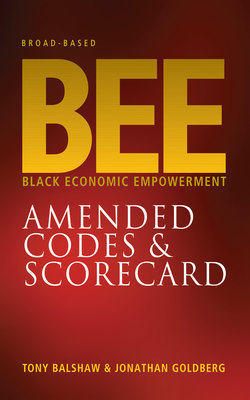Читать книгу Broad-Based BEE - Jonathan Goldberg - Страница 31
На сайте Литреса книга снята с продажи.
CHANGING BELIEFS – IS BEE THE NEW CHEESE?
ОглавлениеThe book Who Moved My Cheese? by Dr Spencer Johnson is a brilliant parable about anticipating, adapting, responding and enjoying change. Relentless change is a reality in our daily business and personal lives. Recognising the need for change and transformation we as South Africans encounter daily, and responding in an appropriate manner, requires us to be ready to change quickly and to handle it again and again – not in the least in relation to BEE implementation.
The parable is about four little mice who ran through a maze looking for cheese to nourish them and make them happy. They had not been paying attention to the small changes taking place each day, and suddenly they found that the cheese was no longer in the place they had found it each day. “It’s not fair,” they shouted. This cry of “not fair” or “reverse discrimination” is often cited in opposing transformational legislation, and is the reason why many transformational pieces of legislation have not worked since 1994. The mice eventually change their beliefs, and find new cheese.
There is, however, a concern that the focus of the Amended Codes on black ownership (57 points), especially majority (51%) black ownership for 32 points, coupled with the substantially increases qualification requirements for the 8 BEE Recognition Levels and onerous Scorecared criteria that the cheese is too remote and not viable from a cost-benefit perspective.
Nevertheless the lessons that the “mice” record in Johnson’s parable include:
•Having cheese makes you happy. (A successful and profitable business?)
•The more important your cheese is to you, the more you want to hold on to it. (Not wanting to change by letting go of ownership?)
•If you do not change, you can become extinct. (Life moves on?)
•What would you do if you weren’t afraid? (Don’t overcomplicate! Get up and move with the cheese?)
•Smell the cheese often so that you know when it is getting old. (Anticipate change?)
•Movement in a new direction helps you find new cheese. (Weighed down and confused by fearful beliefs?)
•When you move beyond your fear, you feel free. (Letting go and trusting in what lies ahead even if not knowing exactly what it is?)
•Imagining myself enjoying new cheese even before I find it leads me to it. (Paint a picture of new cheese?)
•The quicker you let go of old cheese the sooner you find new cheese. (If only we had moved sooner?)
•It is safer to search in the maze than remain in a cheeseless situation. (Actioning a new direction gives strength?)
•Old beliefs do not lead to new cheese. (Continuing change occurs naturally?)
•When you see that you can find and enjoy new cheese, you change course. (New beliefs encourage new behaviours?)
•Noticing small changes early helps you adapt to the bigger changes that are to come. (Wasted time denying that the change had already taken place?)
•Move with the cheese and enjoy it! (Others have to find their own way – no-one can do it for them; teach the lessons of your paradigm shift to others and enjoy the rewards!)
In order to remain competitive, retain market position and leverage off new business opportunities, businesses will need to change their stakeholder profile and other Elements within their organisations. The situation in South Africa is completely different from that of a decade ago and requires different attitudes, approaches and solutions.
